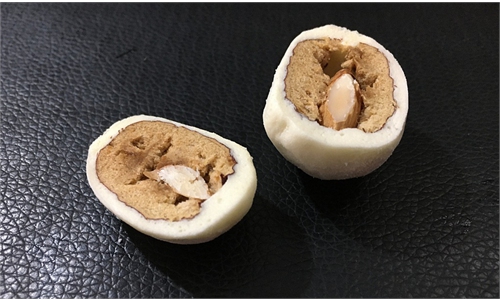
Milk jujubes Photo: VCG
A number of Chinese provinces have launched intensive checks into coronavirus-positive milk jujubes sold from Shandong, with at least 10 provinces including Zhejiang, Anhui, Jiangsu and Sichuan finding problematic milk jujubes as of Sunday, triggering public concern that people could be infected by the contaminated food.
The hashtag "contaminated milk jujubes have flown into several provinces in China" has triggered heated discussions on Chinese Twitter-like Sina Weibo, and has gained over 290 million reads as of press time.
Some netizens suggested not eating the food for now. "(The authorities) have to investigate where the food has flown into," one netizen wrote. Some asked whether the contaminated food could lead to infections.
A total of 32 samples related to milk jujubes tested positive for the virus in Central China's Hunan Province, the local authority announced on Sunday, while 36 samples tested positive in Southwest China's Chongqing. On Sunday, Lianyungang in East China's Jiangsu Province also reported one more coronavirus-positive case of milk jujubes.
The risk of being infected with coronavirus via the food stored in normal temperatures "remains low, as the virus can only survive in normal environments for about two or three days," Yang Zhanqiu, deputy director of the pathogen biology department at Wuhan University, told the Global Times on Sunday.
Whether it is milk jujubes or imported cherries, batches of which previously tested positive for the virus, the possibility of becoming infected by eating the food is tiny, Yang noted.
As the whey powder used in processing the milk jujubes is a kind of "non-cold-chain food" which is dried and stored at room temperature, the batch of milk jujubes had been stored "for almost over half a month, from raw materials import and processing to reaching the hands of consumers," Yang said.
The fact that some food samples tested positive for coronavirus doesn't mean they could lead to infections, as the tests targeted the fragments of viral nucleic acids, and positive results could come from viruses on the food that are alive or dead, Li Ning, deputy director at the China National Center for Food Safety Risk Assessment, said during a press conference on Sunday.
Testing positive for coronavirus only means that the food has been contaminated, Li said, noting that so far no cases have been reported of consumers being infected with the virus through purchasing or processing the contaminated food.
The milk jujubes were produced by Shandong Jiuxu Biotechnology Co, and the imported raw material whey powder used to make them tested positive for the virus in Zaozhuang, East China's Shandong Province.
Shandong Jiuxu Biotechnology Co bought 10 tons of imported whey powder on January 5 as the raw material for the batch of milk jujubes, which later tested positive for coronavirus, according to the local authorities.
The batch of imported whey powder were from the same batch of whey powder imported from Ukraine, which was used to make ice cream and tested positive in Tianjin. All storage of the goods produced by Tianjin Daqiaodao Food Co has been sealed after the samples tested positive on January 14.
Several provincial disease and control authorities have issued reminders to residents not to purchase or eat the milk jujubes produced by the company. However, they also assured residents that there is no cause for panic.

